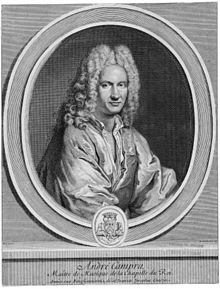André Campra
André Campra (baptized December 4, 1660 in Aix-en-Provence , † June 29, 1744 in Versailles ) was a French composer .
Life
The early years
Campra's father was a doctor from Piedmont, Jean-François Campra, and Campra's mother was called Louise Fabry. He enjoyed his first musical training as a choirboy at the Saint-Sauveur Cathedral in Aix-en-Provence. At the age of 17 he composed his first motets . In 1678 he began church studies in Saint-Sauveur and received the tonsure . In 1681 the cathedral chapter expelled him from the seminary because he had participated in theater performances.
In the same year he took up the position of maître de musique at the Saint-Trophime cathedral in Arles for two years . The following year, on the occasion of the birth of the Duke of Burgundy, a grandson of Louis XIV , he composed his first opera, which is now considered lost.
In 1683 he moved to Toulouse, where he directed the singing school of the Saint-Étienne cathedral; he held this position for eleven years. The musical means were quite modest, he only had serpents and a bass viol to support the singers instrumentally , and Campra managed to add two violin parts. In 1685 he was received as maître de musique at a meeting of the estates of Languedoc in Montpellier .
Campra is not described in any source as an affable character, he is described as choleric, cynical, devoted to alcohol and sympathetic to the Italian party. For these reasons he lost his job in Arles, and his work in Toulouse was not without problems. In 1691, the cathedral chapter demanded that he submit his works to the chapter before each performance. At the height of these tensions, in 1694, with the help of Abbot Lagrange-Trianon, Campra became director of the singing school at Notre Dame de Paris .
From 1697 Campra began setting lyrical works, the ballet opera L'Europe Galante and Le Carnaval de Venise (1699). During this time he had his brother Joseph (1662-1744) sign his secular works in order not to lose his position at Notre Dame , but finally asked in October 1700 to be dismissed from the lucrative service of the Church.
The later years
By 1720 he had composed around fifteen opéras-ballets and tragédies lyriques , some of which were performed several times during his lifetime. He was now a well-known musician and was appointed conductor of the Académie Royale de musique in Paris, not least because the taste of the regent, a student of Marc-Antoine Charpentier , was influenced by Italian. After the death of Louis XIV and the resignation of Michel-Richard Delalande , Campra was, together with Charles-Hubert Gervais (1671–1744) and Nicolas Bernier (1664–1734), sous-maître of the Chapelle Royale in Versailles.
From 1721 Campra was also in the service of the Jesuits at their Church of St. Louis and at the Collège Louis-le-Grand . With the exception of an opera Achille et Déidamie (1735) and two occasional works commissioned by the Prince de Conti ( La Fête de l'Isle-Adam , 1722) for the wedding of the Duke of Chartres ( Le Lis et la Rose , 1724), he only composed church music including around 30 motets , a requiem, numerous psalms and cantatas intended for performance at the Collège Louis-Le-Grand.
In terms of time, Campra is between Jean-Baptiste Lully and Jean-Philippe Rameau . While most composers were completely forgotten immediately after the French Revolution, the works of Campra, Lully and Rameau were occasionally performed. Campra is one of the most important French composers of the first half of the 18th century. He established the then new musical genre Opéra-Ballet . His music is characterized by a certain Franco-Italian lightness and simplicity that permeates both secular and ecclesiastical work.
In 1740, at the age of 79, he resigned from his posts and spent the last four years of his life in seclusion in Versailles.
Works
- Spiritual works:
- Trois livres de cantates, 1708, 1714 et 1728
- Nisi Dominus, 1722
- Messe de morts (Requiem), after 1723
- Motets pour la Chapelle Royale, 1723-1741
- Operas:
- L'Europe galante, opéra-ballet, 1697
- Le carnaval de Venise, opera-ballet, 1699
- Hèsione, tragédie lyrique, 1700
- Aréthuse, 1701
- Tancrède, tragédie lyrique, 1702
- Les muses, 1703
- Iphigènie en Tauride 1704
- Télémaque, 1704 (pasticcio)
- Alcine, 1705
- Hippodamy, 1708
- Les fêtes vénitiennes , 1710
- Idoménée , tragédie lyrique, 1712
- Télèphe, 1713
- Énée et Didon, 1714
- Camille, pure des Volsques, 1717
- Les âges, 1718
- Les sauvages, 1729
- Achille et Déidamie, 1735
literature
- Maurice Barthélémy: André Campra. Sa vie et son oeuvre. Picard, Paris 1957.
- Maurice Barthélémy: André Campra. 1660-1744. Étude biographique et musicologique. Actes Sud, Arles 1995, ISBN 2-7427-0002-1 .
Web links
- Works by and about André Campra in the catalog of the German National Library
- Works by and about André Campra in the German Digital Library
- Sheet music and audio files by André Campra in the International Music Score Library Project
- List of stage works by André Campra based on the MGG at Operone
Individual evidence
- ^ Sylvie Bouissou: Campra, André. In: Ludwig Finscher (Hrsg.): The music in past and present . Second edition, personal section, volume 4 (Camarella - Couture). Bärenreiter / Metzler, Kassel et al. 2000, ISBN 3-7618-1114-4 , Sp. 67 ( online edition , subscription required for full access)
| personal data | |
|---|---|
| SURNAME | Campra, André |
| BRIEF DESCRIPTION | French composer |
| DATE OF BIRTH | baptized December 4, 1660 |
| PLACE OF BIRTH | Aix-en-Provence |
| DATE OF DEATH | June 29, 1744 |
| Place of death | Versailles |
